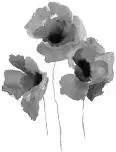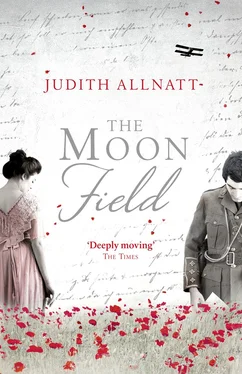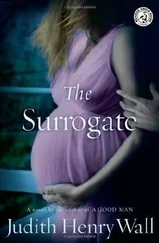‘No need, I’ll be fine,’ she said and took in a huge breath. ‘I’m sorry about all this.’ She half turned but then seemed to remember something. ‘Did you say you had something else for me?’
‘It was nothing, really,’ George said, trying to keep the misery from his voice. She was looking at him more closely now, her brows furrowed in puzzlement.
‘George?’ she said and he could see her expression change to concern as she scanned his face.
‘I told you; it was nothing!’ George said more loudly than he intended, his voice coming out hoarse and strained as he yanked the bike straight and moved past her. ‘George, I didn’t think, I’m so sorry …’ she started.
He could hold on no longer and threw himself at the bike, nearly overbalancing as the postbag swung sideways. He pushed off and stood up on the pedals to gain speed, forcing it along the rutty drive and away from her in a spatter of grit. Gasping for breath, he looked back only once as he reached the bend. She was standing looking after him, silhouetted against the light at the end of the tunnel of trees, her camera slung across her shoulder so that it bulged at her side, her shoulders drooping and her fist still closed over the letter. Then he swung away into the trees that would hide him from view.

When George regained the road after leaving Violet, he wanted to be alone and so he turned the opposite way from home and rode out towards Carlisle. He cursed himself as a fool to have harboured affection in the first place for someone he knew to be so far above his own station, and called himself an idiot not to have guessed that she would have an admirer. He imagined how he must seem in her eyes: a callow boy, not yet a man, a lackey, someone you had to be kind to … Yet, when he thought about her tears, the feelings he had were not boyish: he felt fierce, angry with anyone or anything that could dare to hurt her. He wished, more than anything in the world, that he could wipe the tears away, and that he could comfort her and hold her in his arms. It had been weak to run away! Yet, now that he had run away, now that she must think him a cad, how was he to face her again? The thought of the way they had walked and talked together, the camaraderie they had shared and the feeling that this would never be recaptured weighed upon him; he rode on and on, seeking to blank out emotion with physical sensation, pushing his aching muscles further, seeking relief through sheer fatigue.
He rode and rode until he eventually came to the suburbs of the town, where dirty redbrick terraces crowded straight on to the roads and children dodged unnervingly in and out between the carts and cycles and motors. He turned out of the mêlée and into the haven of a leafy park where he sat on a bench for a considerable time, thinking about Violet and her sweetheart.
After a while he realised that Kitty would be wondering why he hadn’t come back for tea. Three young men were kicking a football around on the lawns and larking about. The light began to wane and he remembered that his mother would be worried, yet he sat on, idly watching them and feeling dispirited.
One of the young men, showing off, kicked the ball high into the beech tree above him, showering him with leaves and breaking his reverie. He listened to them daring each other to get the ball down and watched as they threw sticks, unsuccessfully, until eventually two of them shinned up the tree. There they jumped up and down to shake the branches and urged each other to go higher and further while the third shook his head in disbelief and sat down on the bench next to George. He introduced himself as Ernest Turland, and said to George, ‘One of the bloody fools is going to break his head. Probably Rooke,’ he added. ‘Haycock’s taller and stronger.’ The bigger chap triumphed at last by hanging from the branch where the ball had lodged, his boots appearing alarmingly in mid-air as he swung. The branch creaked ominously but the ball fell with a sound of snapping twigs and rustling leaves just as a park keeper appeared and started to lock up the tennis courts. Catching sight of them, he let out a shout. Turland scooped up the ball and had taken George’s bike by the handlebars before George had even worked out that he would cop it too if he stayed.
‘Come on!’ Turland said and George got on the bike and pushed off, standing on the pedals with Turland perched on the seat with his legs dangling and the ball held tight against his stomach. Behind them, the others clambered down, dropped to the ground and then took off running after them.
‘Go to the Twa Dogs!’ Haycock called out as he swerved between two metal bollards and along a footpath, leaving the bike to take the road.
‘Left! Go left!’ Turland said as they made it to the wrought-iron gates at the edge of the park. George glanced back and saw the park keeper standing with one hand above his eyes peering after them, dazzled by the low sun. He cut left and then followed Haycock, who had re-emerged further along the road, down a series of side roads and back alleys between the terraced houses. When they reached the pub, Turland showed him where to stow the bike behind the privy at the rear and pressed him to come in for a drink. George, carried along on a wave of bonhomie that was new to him, readily agreed. Triumphant after their escape, jostling each other, faces flushed, they all crowded inside.
Turland ordered beers and they squeezed around a table, Rooke pouncing on spare stools and drawing them over. The place was full of men in their working clothes, some sitting at tables, some standing or leaning on the bar and a group playing shove-ha’penny at a board in the corner. The only female was a young woman with a figure that was beyond buxom, who was squeezing between tables to collect up the glasses. She paused beside a swarthy, heavily built man in shirtsleeves and braces who sat alone at a corner table reading a newspaper. George heard him ask for whisky and push some coins over to her without bothering to look up from his paper. She went straight to the bar and returned with a whisky glass, before carrying on stacking spent glasses. A fug of cigarette and pipe smoke hung in the air; the smell of Capstans mixing with the fruity smell of the briar. The whitewashed walls of the room had been turned a glossy brownish-yellow by the smoke. The only decoration in the place was a handful of paper Union Jack flags in a stoneware jar on the bar and a couple of pen-and-ink caricatures in frames, their faded mounts scattered with thrips, trapped behind the glass.
Behind the bar, a balding man with a sour face was pulling pints. He nodded to a younger man who came in briefly to change a barrel and then rolled the empty one out, cursing as it stuck in the doorway and kicking it through.
‘As I said, Ernest Turland, junior reporter.’ Turland offered him a hand wet with slopped beer. ‘And this is Tom Haycock, from the gas works, and Percy Rooke …’
‘… of no fixed employment,’ Rooke cut in.
‘Currently delivery boy and general factotum at the Cumberland News but with an eye to advancement,’ Turland said, punching Rooke lightly on the arm.
George introduced himself as George Farrell and, when pressed about why he had been sitting alone and mournful in a strange town, gave a vague answer about having had a disappointment and quickly asked how they came to be friends.
‘Turland and I were in the scouts together,’ Haycock said, ‘and Rooke lives at Turland’s lodgings.’
‘Under the dragon’s eye,’ Rooke said. ‘She even counts the toast at breakfast.’
Читать дальше













